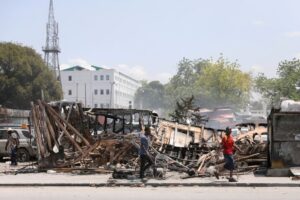A destructive Greco-Turkish war in the Eastern Mediterranean is not the most probable outcome of the competitions in the region, but it is a scenario whose prospects have been raised recently.
In the waters south of the Greek island complex of Dodekanisos, south of the island of Crete and around Cyprus, the war fleets of the two states are constantly facing each other, while powerful US and French warships are permanently present in the same waters. At the same time, diplomatic and geopolitical “initiatives” are on the agenda on a daily basis.
The armed forces of Greece and Turkey are in a state of combat readiness and military drills using real firepower have become very frequent. In the Mass Media of both countries, there is a daily parade of veteran officers and nationalist “intellectuals” who try to accommodate the populations on both sides of the Aegean Sea with the paranoid prospect of an all-out war.
In this situation, the possibility of a “hot incident” (meaning a brief and limited military confrontation) is now an immediate threat—either as an “accident” or as a voluntary “escalation” from either side. The worst part is the proliferation of voices who claim that in case of a “hot incident” we should avoid a policy of restraint and opt for an impulsive generalization of the war “until victory.”
The international alliance that during the Cold War was known as the Western Camp, has taken sides in support of Greece. Inside its ranks, there are various levels of willingness for a direct confrontation with Turkey, but there is no doubt that they support the main positions of the Greek State in its competition with Turkey.
The US, under the leadership of Donald Trump, signed the agreement for a strategic upgrade of military cooperation with Greece. This agreement provides for an upgrade of the US military base in Souda (Crete) and the establishment of further NATO and US military bases in the Greek mainland. According to the State Department, the USA considers the Greek State as a strategic pillar in the “arc of containment” against Russia and China in the Eastern Mediterranean. The very experienced and “hyperactive” US ambassador in Athens, Geoffrey Pyatt, has also made this claim in public interventions repeatedly.
It is impressive that the signing of this agreement and the overall converging with the US policy was orchestrated by the government of Alexis Tsipras, in complete agreement with the right-wing party of New Democracy.
The European Union is escalating its pressure on Turkey, warning Turkey’s president Recep Tayyip Erdoğan that in the next Summit—at the end of September—they could decide serious economic and diplomatic sanctions against it.
The German leadership—which is holding the EU presidency this semester, but which also has important financial activities inside the Turkish economy—supports a combination of “the carrot and the stick” when it comes to the European position towards Erdoğan. Here in Athens, this approach is presented as “hesitating” in the face of a needed confrontation.
On the other side, France—under the leadership of Emmanuel Macron—seems like it has crossed the Rubicon, something that provokes a delirium of excitement in the Greek Mass Media: France obtained a permanent naval base in Cyprus, the (flagship of the French Navy) “Charles De Gaul” aircraft carrier “patrols” the area in the most critical moments, and Macron approved a massive armaments program for the Greek State, which includes the creation of state-of-the-art warships (Belharra frigates) and the delivery of Rafale fighter jets.
The Euro-Atlantic forces claim that with this policy they are defending peace in the Eastern Mediterranean.
During the recent Conference of the “Mediterranean 7” (France, Spain, Italy, Portugal, Malta, Cyprus and Greece) in Ajaccio-Corsica, Macron invoked the idea of a “Pax Mediterranea,” which was welcomed with cheers from Greek prime-minister Mitsotakis and with furious anger from Ankara.
Macron’s “Pax” has little relation to liberty, equality and fraternity. The day after the pompous “Declaration” of Ajaccio, the Moria camp in Lesbos was set on fire and thousands of refugees who were incarcerated there—facing racist abjection and the threat of the coronavirus—are now in a dire situation. No one is allowed to forget that the misery that plagues the refugees has its roots in the racist agreement signed between the EU, Turkey and Greece.
This “Pax” has little relation with democracy, despite the fact that the governments represented in Ajaccio can claim a democratic mandate in elections. The actual “program” of Macron’s Pax Mediterranea is promoted on the ground by a different alliance: the “axis” which along with Greece and Cyprus, includes the State of Israel and general Sisi’s dictatorial regime in Egypt. After the latest diplomatic moves of Israel, it is possible that this “axis” will broaden, incorporating some of the most reactionary monarchies in the Arab world.
Finally, Macron’s “Pax” is not so “Mediterranea.” Beyond the obvious military and diplomatic alignment with the US, there is also the financial aspect: the French oil company Total and the Italian company Eni, who have rushed to enlist in the project of extracting the hydrocarbons of the Eastern Mediterranean and the ambiguous project of constructing the East Med undersea pipeline, are operating under the “coordination” (meaning the leading role) of American Noble Energy, part of multinational giant Chevron.
These are the realities behind the cheap demagoguery about peace in the Mediterranean.
Rift
In the 70’s, Greco-Turkish relations reached the verge of a military confrontation, after the Greek-orchestrated military coup in Cyprus and the subsequent Turkish military invasion that led to the partition of the island.
The fall of the military junta in Greece, the fear of the bourgeois leaderships about the devastating consequences of an all-out war and pressure from Europe and the US in order to preserve the unity of NATO’s “southeastern wing” cancelled that prospect back then. The ruling classes in both sides of the Aegean were forced to contain themselves in a context of “competitive co-existence,” where two “sub-imperialisms” were competing for regional hegemony but restraining their ambitions under the discipline of the broader context.
Recent developments are the outcome of two factors.
On the one hand, under the leadership of Erdoğan, there was a rift in Turkey’s relationships with the State of Israel first and then with the US and the “Western Camp” in general. After the failed coup attempt of 2016, this rift became more obvious and it is already producing political and diplomatic results, though it would be wrong to consider this development as a definitive fact. Turkey is a big country that holds a crucial geographic place and remains important for NATO; sudden “shifts” in its geopolitical orientation are not uncommon in its history.
The second factor that helps understanding the current crisis was the discovery of hydrocarbon reserves at the bottom of the Eastern Mediterranean—in Israeli and Egyptian waters first, then offshores of Cyprus and lately south of Crete. The potential to exploit these reserves (a potential which is still unclear in most cases) brought onto the surface the issue of Exclusive Economic Zones (EEZ), meaning issues of sovereign rights in waters that until now were treated as international waters.
It was the combination of these two factors that gave life to the military/economic/diplomatic “axis” of Israel-Cyprus-Greece-Egypt. The East Med project leads to a delimitation of EEZs in the Eastern Mediterranean that divides the Sea exclusively among the member-states of the “axis.” The latter made sure to quickly cede the rights to research, extraction and commercial exploitation of the hydrocarbons to a powerful consortium of American and European fossil fuel multinationals. For this project, it is crucial to safeguard the geographic continuity between the EEZs of Israel, Cyprus and Greece, so that the East Med pipeline can materialize. For this to happen, Turkey must be marginalized in the Eastern Mediterranean and the rights of other countries such as Palestine, Lebanon and Syria must be seriously downgraded.
We have said repeatedly that it is extremely doubtful that such a plan can be materialized in a peaceful way.
The international radical Left is aware of the reactionary antidemocratic nature of Erdoğan’s regime. It is familiar with its constant attacks against the workers, the Kurdish activists, the social movement and left-wing militants. Revulsion against this situation is justified and correct. But it would be wrong to treat the Turkish people as a unified and helpless entity, incapable to think and act on its own. For example, polls in Turkey showed that a big part of the population disagreed with Erdoğan’s pursuit to transform the monument of Agia Sofia into a mosque.
But for those of us who live in neighboring countries, our tasks are more complex. We must confront “the enemy at home,” and we are obliged to fight against “our own” dangerous nationalism.
There are many who do not accept the warmongering frenzy, and they hope that a confrontation will be avoided in the end through International Law and the relevant institutions. This has been proven to be an illusion until now.
Turkey has not signed many of the international agreements that regulate the Law of the Sea. But today, realizing the negative balance of forces against it and calculating that the maximalist Greek demands cannot stand, it is promoting initiatives that lead to the Hague International Court of Justice. But it demands rulings for the whole range of disputes between Greece and Turkey.
On the reverse, Greece claims that its demands are based on and justified by International Law. But it refuses to participate in any international legal procedure that will include rulings on issues that the Greek State has “solved” with unilateral actions (militarizing the islands of the Eastern Aegean, expanding its sovereignty on disputed isles and rocks, expanding its airspace at 10 miles, which is beyond its territorial waters that reach 6 miles). At the same time, a part of the state bureaucracy, knowing full well that Greek demands in relation with its EEZ are maximalist, resists any prospect of resorting to the International Court, warning that in such a legal procedure the outcome could be a compromise that would be “harmful to the nation’s interests.”
This means that the confrontation continues with the “fait accompli” method of unilaterally imposing facts on the ground. As we have witnessed this past summer, this method involves the threat of a “hot incident,” which can prove to be hard to control and lead to a war.
History
It is a tragic irony that all this is happening 100 years after the last Greco-Turkish War in 1918-22, for which both peoples paid a heavy price.
In the end of the First World War, the Great Powers of the time were pushing for the partition of the Ottoman Empire, thus encouraging Greek leader Eleftherios Venizelos to invade Asia Minor. The Greek army marched deep into Anatolia, occupying swaths of land way to the east of the coast and reaching the outskirts of Turkish capital Ankara.
But when the English, the French and the Italians secured the annexations they sought, they turned towards a normalization of their relationships with the new Turkish regime of Kemal Ataturk, abandoning their former allies. The collapse of the Greek army was immediate. In the Turkish counterattack, 1.5 million Greek-speaking residents of Asia Minor left their homes and settled as refugees in Greece. Their tragic experience because of this adventurism of the Greek army led to their radicalization: Refugees formed the backbone of the workers’ movement and the communist Left during the 30’s and the 40’s.
But history provides another instructive example also. In 1930, understanding that a financial crisis was looming, Venizelos and Ataturk co-signed a Peace and Partnership Agreement, which included the mutual recognition of existing borders and a reduction in military spending. The initial capitalist modernization in both countries was founded on a policy of peace and cooperation. In 1934, the warmonger Venizelos suggested Kemal Ataturk as a candidate for the Peace Nobel Prize…
Today, both countries are facing a severe economic and social crisis. In the midst of such a crisis, the policy of armaments is absurd. A military confrontation will be devastating for all the people, on both sides of the Aegean, and yet it remains possible.
Taking a stand against war, defending peace as a major good for the popular masses, unilaterally rejecting armaments, and breaking with imperialist alliances are irreplaceable points of the “program” for any emancipatory policy. In the current situation of the climate crisis, this antiwar policy must combine with the rejection of the extractivist strategy that threatens to send us to the slaughterhouse of war as cannon fodder for the profits of Big Oil.
Antonis Davanellos is a leading member of DEA (Workers' Left) in Greece.




